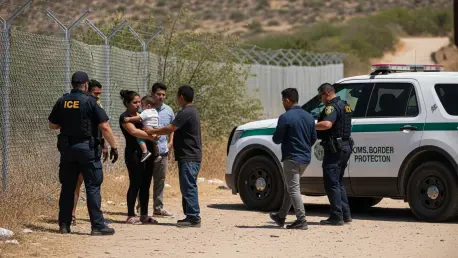Imagine a community where a simple trip to a routine check-in can tear a family apart, where individuals without criminal records face sudden detention, and where the very notion of due process seems to crumble under harsh policy. This is the stark reality for many immigrants in the United States today, as enforcement tactics grow increasingly punitive. This roundup article gathers diverse perspectives from community leaders, legal experts, and political figures to uncover the profound challenges and human toll of current immigration enforcement practices. By synthesizing insights from various voices, the aim is to shed light on systemic issues and spark meaningful dialogue about reform and compassion in a deeply divided landscape.
Uncovering the Crisis: The Context of Immigration Enforcement Struggles
In a historic setting in Tampa’s Ybor City, over 100 individuals recently came together at a town hall to voice concerns about immigration policies. Community organizers and advocacy groups facilitated a platform where the urgency of the issue was palpable, emphasizing how enforcement methods disrupt lives and challenge core legal principles. Attendees highlighted the need to address these policies not as abstract issues but as real, personal crises affecting neighbors and families.
The discussion revealed a consensus on the severity of the situation, with many pointing to the erosion of trust in systems meant to protect. Panelists and participants alike stressed that harsh tactics often target vulnerable populations, amplifying fear rather than fostering security. This gathering set the stage for deeper exploration, as voices from different backgrounds shared a unified call for understanding the broader implications of these enforcement strategies.
A key takeaway from this event was the recognition that immigration enforcement is not just a policy debate but a humanitarian concern. The stories shared underscored a pressing need to examine how current practices align with national values. As the roundup unfolds, insights from legal and political spheres will further illuminate the multifaceted challenges at play.
Examining the Brutal Realities of Immigration Enforcement Tactics
Cruelty Embedded in Policy: Methods That Undermine Dignity
Across various forums, legal advocates have consistently pointed out the intentional harshness in enforcement approaches, such as detaining individuals with no criminal history during routine interactions. Reports from community events reveal cases where parents are separated from children, a tactic described as deterrence-driven rather than justice-oriented. Such actions are often justified by narratives of criminality, yet many argue they are excessively punitive for minor or civil infractions.
Data shared at public discussions shows a notable rise in arrests by immigration authorities targeting non-criminal immigrants, painting a picture of policy designed to instill fear. Community leaders argue that this approach disregards the human element, focusing instead on numbers over narratives. The emotional weight of these separations resonates in shared accounts of families left in limbo, waiting for resolution.
Ethical concerns dominate these conversations, with some panelists at town halls questioning whether the stated goals of safety justify the evident suffering. There is a growing sentiment that such measures alienate communities rather than protect them. This perspective challenges the rhetoric often used to defend stringent enforcement, urging a reevaluation of priorities in policy design.
Due Process in Decline: Legal Protections Under Threat
Legal experts speaking at public gatherings have raised alarms over policies that bypass traditional safeguards, such as expedited removal processes allowing deportation within a day without court hearings. This rollback of protections means individuals often lack the chance to defend their cases, a situation described as a direct assault on fairness. The unpredictability of detentions further compounds the issue, leaving communities in a state of constant anxiety.
Real-life implications are evident in stories of individuals detained during mundane activities, treated with a severity typically reserved for criminal offenses. Such practices blur the line between civil and criminal violations, creating a climate of uncertainty. Legal voices emphasize that this approach not only affects those directly targeted but also ripples through entire neighborhoods, fostering mistrust.
The collaboration between local law enforcement and federal immigration authorities, through programs like 287(g), has been flagged as a significant concern. Critics argue that this melding of roles undermines community safety by deterring immigrants from seeking help or reporting crimes. The consensus among many advocates is that rebuilding trust requires a clear separation of these functions to ensure local agencies prioritize public welfare over federal mandates.
Isolation as a Tool: Harsh Treatment of Detainees and Systemic Obstacles
A troubling trend noted by legal representatives at community discussions is the relocation of detainees to facilities far from their support networks. This practice is seen as a deliberate effort to isolate individuals, making it harder for them to access legal aid or family support. Such tactics are criticized for exacerbating the vulnerability of those already in precarious situations.
Regional differences in enforcement intensity also come under scrutiny, with some areas showing more aggressive implementation of federal-local partnerships. In places like Florida, the impact of these agreements is particularly pronounced, raising questions about scalability and future consequences if left unchecked. Observers note that this patchwork of severity creates disparities in how policies affect different communities.
Contrary to assumptions that harsh treatment deters migration, many community leaders argue it instead breeds fear and weakens the integrity of the legal framework. Discussions at public forums suggest that punitive measures often fail to address root causes of migration, instead creating cycles of trauma. This perspective pushes for a shift toward solutions that prioritize understanding over punishment.
Political Manipulation: Immigration as a Divisive Issue
Historical analyses shared during public panels reveal a stark shift in how immigration is framed, moving from a topic of bipartisan reform to one steeped in criminalization narratives. Political figures have noted that earlier discussions often centered on pathways to legal status, a stark contrast to today’s punitive focus. This change is attributed to strategic messaging that leverages fear for electoral gain.
Media’s role in deepening public divides is another point of contention, with commentators at town halls highlighting how polarized coverage shapes conflicting perceptions of immigrants. While some outlets emphasize threats, others focus on contributions, creating a fragmented understanding among the public. Experts in political communication stress that this disparity hinders constructive dialogue on reform.
Looking ahead, there is speculation on whether ongoing politicization will obstruct meaningful policy changes or ignite grassroots efforts for change. Some voices at community events express hope that increased awareness can counter divisive tactics, pushing for a return to collaborative solutions. The challenge lies in navigating a landscape where immigration remains a wedge issue, often overshadowing the human stories at its core.
Core Takeaways: Understanding the Impact of Stringent Enforcement
Drawing from diverse perspectives at public forums, several critical insights emerge about immigration enforcement. The systemic cruelty embedded in current tactics, the erosion of legal safeguards, and the political exploitation of the issue stand out as major threats to fairness. These elements collectively paint a picture of a system prioritizing deterrence over dignity, a concern echoed across different sectors of advocacy.
Practical steps to address these challenges include supporting legal challenges by civil rights organizations, pushing for legislative reforms, and amplifying personal narratives to humanize the debate. Community leaders at town halls advocate for active involvement, suggesting that public pressure can influence policy direction. Their recommendations focus on grassroots efforts to ensure the voices of affected individuals are heard in decision-making spaces.
Engagement opportunities are abundant, from participating in local discussions to reaching out to elected officials with calls for change. Supporting organizations that provide direct aid to immigrants also offers a tangible way to make an impact. These actionable measures, drawn from collective insights, aim to equip individuals with tools to contribute to a more equitable immigration framework.
Reflecting on the Human Cost: Lasting Lessons and Next Steps
Looking back on the discussions held at various community events, the profound human toll of immigration enforcement became painfully clear. The stories of separation, fear, and systemic barriers shared during these gatherings underscored a collective plea for compassion over punishment. Each perspective, whether from legal minds or affected families, added depth to the understanding of how policies translate into personal struggles.
Moving forward, the focus should shift to actionable solutions that address both immediate needs and long-term reform. Building coalitions across political divides could pave the way for policies that restore due process and prioritize humane treatment. Additionally, investing in public education campaigns to counter dehumanizing narratives offers a path to reshape societal views on immigration.
Another vital step involves strengthening community networks to provide support for those navigating enforcement challenges. Encouraging collaboration between local governments and advocacy groups can help rebuild trust eroded by current practices. These efforts, inspired by the powerful voices at town halls, represent a commitment to upholding dignity and justice in every policy decision.









